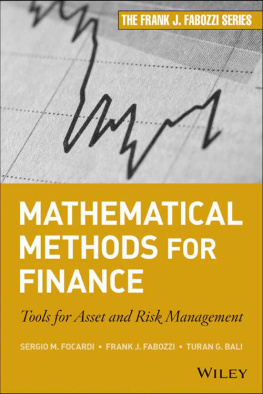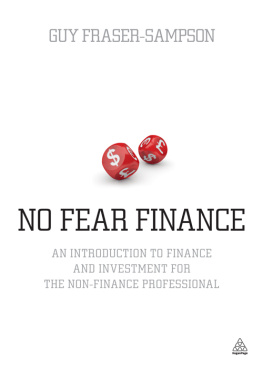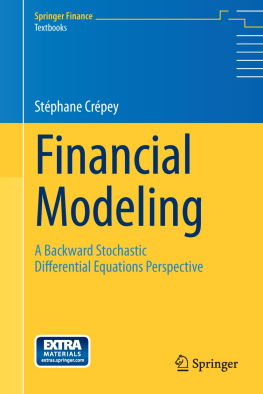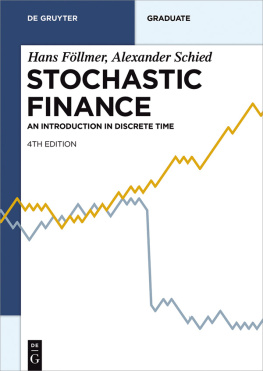POPULARITY
A Bridge between Classical
and Behavioral Finance
Roger G. Ibbotson, Thomas M. Idzorek, CFA, Paul D. Kaplan, CFA, and James X. Xiong, CFA
Statement of Purpose
The CFA Institute Research Foundation is a not-for-profit organization established to promote the development and dissemination of relevant research for investment practitioners worldwide.
Neither CFA Institute Research Foundation, CFA Institute, nor the publications editorial staff is responsible for facts and opinions presented in this publication. This publication reflects the views of the author(s) and does not represent the official views of CFA Institute Research Foundation.
CFA, Chartered Financial Analyst, and GIPS are just a few of the trademarks owned by CFA Institute. To view a list of CFA Institute trademarks and the Guide for the Use of CFA Institute Marks, please visit our website at www.cfainstitute.org.
2018 CFA Institute Research Foundation. All rights reserved.
No part of this publication may be reproduced, stored in a retrieval system, or transmitted, in any form or by any means, electronic, mechanical, photocopying, recording, or otherwise, without the prior written permission of the copyright holder.
This publication is designed to provide accurate and authoritative information in regard to the subject matter covered. It is sold with the understanding that the publisher is not engaged in rendering legal, accounting, or other professional service. If legal advice or other expert assistance is required, the services of a competent professional should be sought.
Cover photo credit: Ho Ngoc Binh / Moment / Getty Images
ISBN 978-1-944960-61-2
Biographies
Roger G. Ibbotson is Professor in the Practice Emeritus of Finance at Yale School of Management. He is also chairman of Zebra Capital Management, LLC, a global equity investment and hedge fund manager. Professor Ibbotson is founder and former chairman of Ibbotson Associates, now a Morningstar company. He has written numerous books and articles, including Stocks, Bonds, Bills, and Inflation with Rex Sinquefield (updated annually), which serves as a standard reference for information and capital market returns. Professor Ibbotson conducts research on a broad range of financial topics, including popularity, liquidity, investment returns, mutual funds, international markets, portfolio management, and valuation. He recently published The Equity Risk Premium and Lifetime Financial Advice . Professor Ibbotson has also co-authored two books with Gary Brinson, Global Investing and Investment Markets . He is a regular contributor to and editorial board member of both trade and academic journals and serves on numerous boards, including Dimensional Fund Advisors funds. Professor Ibbotson frequently speaks at universities, conferences, and other forums. He received his bachelors degree in mathematics from Purdue University, his MBA from Indiana University, and his PhD from the University of Chicago, where he taught for more than 10 years and served as executive director of CRSP.
Thomas M. Idzorek , CFA, is chief investment officer, retirement, for Morningstar Investment Management LLC. He also serves as a member of Morningstars 401(k) committee and Public Policy Council, chair of Morningstars overall Research Council, and as a member on the editorial boards of Morningstar magazine and the CFA Institute Financial Analysts Journal . Idzorek was formerly president of Morningstars global investment management division, where he oversaw the firms global investment advice, consulting, retirement solutions, broker/dealer, index, and financial wellness businesses. Additionally, he has served as president of Ibbotson Associates, president of Morningstar Associates, board member/responsible officer for a number of Morningstar Investment Management subsidiaries, global chief investment officer for Morningstar Investment Management, chief investment officer for Ibbotson Associates, and director of research and product development for Ibbotson. Most recently, Idzorek served as head of investment methodology and economic research for Morningstar. Before joining Ibbotson, he was a senior quantitative researcher for Zephyr Associates. Idzorek has written numerous articles for academic and industry journals and collaborated on papers that have won a Financial Analysts Journal Graham & Dodd Scroll Award. He is an expert on multiasset class strategic asset allocation, the BlackLitterman model, target date funds, retirement income solutions, fund-of-funds optimization, risk budgeting, and performance analysis. Idzorek is the key methodological creator of Morningstars target date and retirement managed account (robo-advice) solution. He holds a bachelors degree in marketing from Arizona State University and a masters degree in business administration from Thunderbird School of Global Management.
Paul D. Kaplan , CFA, is director of research for Morningstar Canada and is a senior member of Morningstars global research team. He led the development of many of the quantitative methodologies behind Morningstars fund analysis, indexes, adviser tools, and other services. Kaplan conducts research on asset allocation, retirement income planning, portfolio construction, index methodologies, and other investment topics. Many of his research papers have been published in professional books and publications, such as the Financial Analysts Journal and the Journal of Portfolio Management , and he has served on the editorial board of the Financial Analysts Journal . Kaplan has received a Graham & Dodd Top Award and a Graham & Dodd Award of Excellence. Many of his works appear in his book Frontiers of Modern Asset Allocation . Previously, he has served as quantitative research director for Morningstar Europe in London, director of quantitative research in the United States, and chief investment officer of Morningstar Associates, LLC, where he developed and managed the investment methodology for Morningstars retirement planning and advice services. Previously, Kaplan was a vice president of Ibbotson Associates and served as the firms chief economist and director of research. Prior to that, he served on the economics faculty of Northwestern University, where he taught international finance and statistics. Kaplan holds a bachelors degree in mathematics, economics, and computer science from New York University and a masters degree and doctorate in economics from Northwestern University.
James X. Xiong , CFA, is head of scientific investment management research at Morningstar Investment Management. He leads research and develops new methodologies and algorithms on the time-varying capital markets model, tail risk management, portfolio optimization, asset allocation, dynamic portfolio choice, insurance product allocation, mutual fund selection, alternative asset class investments, Monte Carlo simulations, and other investment and financial planning areas. Xiongs work has been published in the Financial Analysts Journal , Journal of Investment Management , Journal of Portfolio Management , Journal of Risk Management in Financial Institutions , and Journal of Financial Planning , among other publications. His co-authored Liquidity Style of Mutual Funds was awarded with a Graham & Dodd Scroll, and his co-authored Momentum, Acceleration and Reversal won a Harry M. Markowitz Award. Xiong has published more than 15 papers in scientific journals, including Physical Review Letters , a prestigious world journal in physics. He holds a bachelors degree in physics from Wuhan University in China and a doctorate in physics from the University of Houston.






![Daniel Crosby [Daniel Crosby] - The Laws of Wealth: Psychology and the secret to investing success](/uploads/posts/book/124058/thumbs/daniel-crosby-daniel-crosby-the-laws-of-wealth.jpg)


